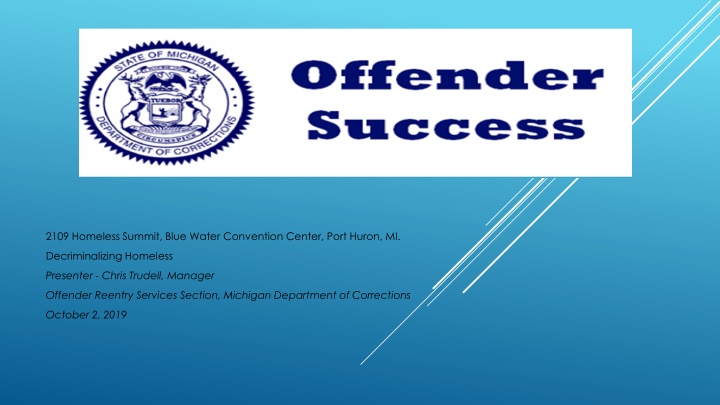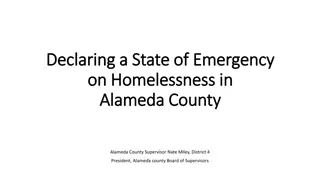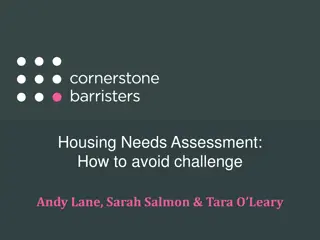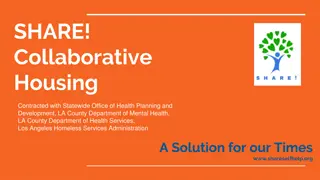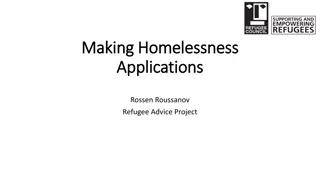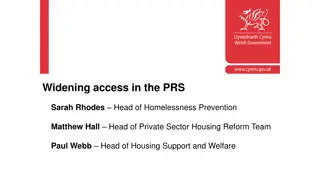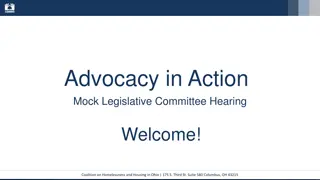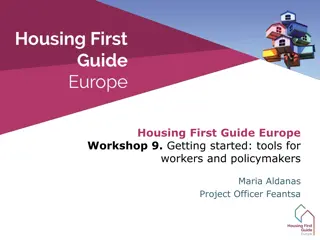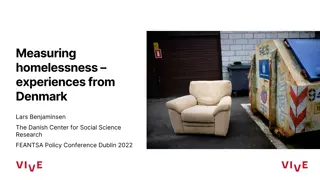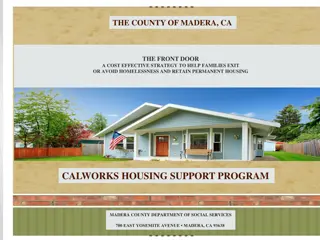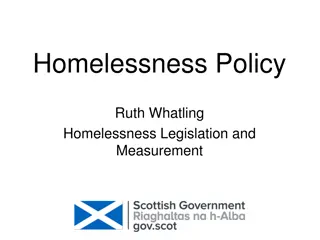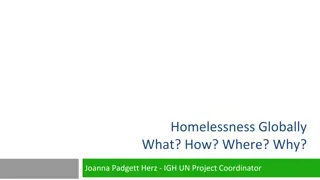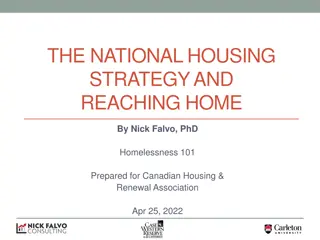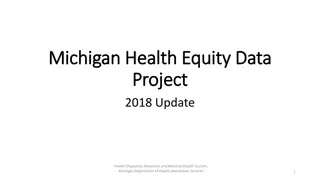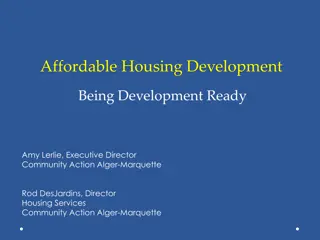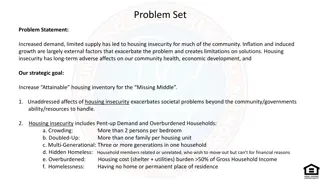Efforts to Address Housing and Homelessness in Michigan Department of Corrections
Overview of Michigan Department of Corrections' initiatives to tackle housing and homelessness issues by providing transitional housing services, prison in-reach assistance, and collaborating with agencies like MSHDA. Efforts include developing housing plans for released prisoners, offering rental support and case management services, and partnering with communities to provide essential items to the homeless. The department aims to address gaps in housing support for parolees and individuals under community supervision to ensure successful reentry into society.
Download Presentation

Please find below an Image/Link to download the presentation.
The content on the website is provided AS IS for your information and personal use only. It may not be sold, licensed, or shared on other websites without obtaining consent from the author.If you encounter any issues during the download, it is possible that the publisher has removed the file from their server.
You are allowed to download the files provided on this website for personal or commercial use, subject to the condition that they are used lawfully. All files are the property of their respective owners.
The content on the website is provided AS IS for your information and personal use only. It may not be sold, licensed, or shared on other websites without obtaining consent from the author.
E N D
Presentation Transcript
2109 Homeless Summit, Blue Water Convention Center, Port Huron, MI. Decriminalizing Homeless Presenter - Chris Trudell, Manager Offender Reentry Services Section, Michigan Department of Corrections October 2, 2019
Presentation Overview Overview of MDOC efforts to address housing and homelessness with community-supervised parolee populations. Housing Choice Voucher Program Collaboration with MSHDA
Michigan Department of Corrections Efforts Addressing Housing and Homelessness Prison In-Reach assistance - develop pre (prison) release housing plans for prisoners needing commercial placement , meaning they don t have stable housing options, once paroled. MDOC funds Transitional Housing (TH) services across the state with 3,084 parolees provided housing services last performance year. TH services includes rent/housing costs, monitoring, case management, housing supplies, rental start-up costs. OS-funded housing stock consist of a combination of landlords, motels, residential programming centers and shelters. Average Length of Stay is currently 57 days.
OS Funded Housing - Addressing Gaps Provide housing and supports for those released (from prison) who do not have stable housing. Provide housing and supports for those under MDOC community supervision who suddenly become homeless. Provide assistance for those in our housing program who become employed or attain benefits but need assistance in getting into their own apartment (rental start-up). Assistance with searching for rental properties and advocacy with property owners. Michigan s local communities stepped up to assist in providing donated food/hygiene items, cleaning supplies, cookware, clothing and furniture leveraged through MDOC s contractors and their network of local; faith-based organizations, non-profits, thrift stores and citizens.
BACKGROUND - COLLABORATING ON WAYS TO ADDRESS HOMELESSNESS WITH RETURNING CITIZEN POPULATIONS
MOU Michigan State Housing Development Authority & Michigan Department of Corrections Promote positive outcomes for enrolled parolees in achieving permanent supportive housing One year agreement and shall automatically renew for each successive one year period unless terminated by either party. Project began in October 2017 with 100 Vouchers. Program outcomes Successful Participant is financially able to secure their own housing, (no longer requires the use of the HCV) through any combination of employment, benefits or other household income OR participant is no longer under the jurisdiction of MDOC and is able to maintain stable housing with the MSHDA voucher Unsuccessful Terminated from the initiative due to either violating Federal or MSHDA requirements (e.g., non-payment of rent, unreported incomed, unauthorized occupants) OR participant returns to prison as a result of a sustained technical violation of supervision requirements, new crime or absconds from parole supervision over 30 days.
Development of a HCV project guide covering key program aspects such as: Pre-Screen process conducted by MDOC HCV final Determination MSHDA Landlord location and Approval Process Process for addressing vacated stays to keep parolees in the voucher program to accommodate Short stays in jail or alternative residential programming centers, abscond behavior under 30 days, or participation in substance abuse treatment Back-rent issues accrued due to vacated stays to minimize risk on the landlord losing rent and parolee losing their voucher. Establish and maintain regional HCV waitlists, through MSHDA s existing web- based HCV system exclusively for MDOC offenders pre-screened as eligible and maintained by MDOC contractor staff approved by both MDOC and MSHDA. Allow MDOC to consult with MSHDA on HCV termination hearings Process to seek DHS State Emergency Funding (SER) to support utility/security deposit costs for indigent offenders.
FY2018 - 100 VOUCHERS WERE ALLOTTED WITH EACH REGION GIVEN A FIGURE
BREAKOUT OF VOUCHER LEASES BY REGION AS OF APRIL/2019 REGION ONE 2 REGION SIX - 9 REGION TWO 0 REGION SEVEN - 1 REGION THREE 4 REGION EIGHT - 1 REGION FOUR 9 REGION NINE - 7 REGION FIVE 2 REGION TEN - 24
Program Statistics as of April/2019 (1 year into the project) Total of 59 voucher holders who resided in leased apartments, of these: 31% were women, 69% were men 22 had successfully discharged of MDOC supervision retaining their voucher, 36 were currently under parole supervision with 1 losing their voucher having returned to prison for parole violation (total of 59) with a recidivism rate of leased up cases of 1.7%. (1 of 59 returned to prison). Eleven (11) dependents resided with 7 leased up cases. Average Monthly Rent portion paid by the voucher = $548.00 Average Monthly Rent portion paid by the parolee = $116.00 Average Total Monthly Rent = $664.00
Observations Changes made in April/2018 to expand target pool of applicants, lowering violation-free and homeless status from 60 to 30 days and including parolees with unstable housing such as living with others (e.g., couch surfing). Changes made to send MSHDA application packets, to MDOC contract case management staff, rather than the parolee address, has improved getting the information back to MSHDA timely, (vital documents, income verification, etc.) lowering the risk of denial due to non-responding to information requests. Program accommodates parolee stays in residential substance abuse treatment without losing their voucher. Challenges remain in finding suitable landlord housing, but advocacy helps (local Resource Navigator and parole agents) Wrap around supports these parolees receive, employment services, transportation assistance, benefits access and such as furnishings, food/clothing and housing supplies make a difference all within the umbrella of case management support.
Present and Future Current statistics as of September 1 (100 vouchers): 77 parolees are in leased up apartments 13 have vouchers but still awaiting a lease up Remaining 10 in various stages of voucher approval Future MDOC/MSHDA plan to continue project into FY2020 with discussions underway for possible increase in voucher allotment beyond 100. Possibly expand voucher program for MDOC supervised probationers (Wayne County).
To Know More About MDOCs Housing Approaches by Region Contact Our Local Community Coordinators or MDOC s Office of Reentry Services or MDOC s Office of Offender Reentry Services Chris Trudell, Manager Offender Reentry Services, (517) 241-5674, trudellc@michigan.govchigan.gov Jason Sides Great Lakes Recovery Centers Services jsides@greatlakesrecovery.org (906) 458-0616 Region 1 Jessica Willis, Networks Northwest Jessica.Willis@networksnorthwest.org (231) 929-5023 Region 2 (989) 732-3886 Ext. 4227 Todd Cook Michigan Works Region 7B Angie Sprank Michigan Works West Central Shana Turner Michigan Works Region 7B Robert Esselink Catholic Charities Genesee/Shiawassee tcook@michworks4u.org Region 3 (616) 902-5994 Region 4 prccsprank@gmail.com (989) 820-0581 sturner@michworks4u.org Region 5 resselink@ccsgc.org (810) 232-9950 Ext. 704 Region 6 Amber Paxton Center for Financial Empowerment, City of Lansing Derek Knuth Berrien/Cass/Van Buren Michigan Works Amber.paxton@lansing.gov (517) 483-4530 Region 7 knuthd@kinexus.org (269) 927-1064 Ext. 1125 Region 8 Rick Holmberg Catholic Social Services of Washtenaw rholmberg@csswashtenaw.org (734) 971-9781 Region 9 Cyrus Wheeler Health Management Systems of America Cyrus.Wheeler@HMSAnet.com (800) 847-7240 ext. 216 Region 10-Wayne & Oakland Paula Keena Macomb/St. Clair Workforce Dev. Board pkeena@macomb- stclairworks.org (586) 469-5220 (810) 966-3323 Region 10- Macomb & St. Clair
